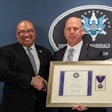Florida Highway Patrol Officers must lose weight to be eligible for a $500 bonus this year. And some on the 1,600-member force are not very happy.
"Being 15 to 25 pounds over the weight requirement has never been a hindrance," said Sgt. Jim Rhyne, chairman of the Florida branch of the International Union of Police Assns. Under current guidelines, Rhyne said, "someone, let us say 17 pounds overweight, who wrote the most tickets, worked the most complicated crashes and solved them wouldn't be eligible for the bonus." At 6-foot-4, the 47-year-old Rhyne tips the scales at 267 pounds, 36 more than the maximum prescribed by the Highway Patrol's height-weight chart. But he says the extra weight doesn't hamper his effectiveness.
"I am in the mold of a big old boy, very intimidating," said the Orlando-based trooper, conjuring up film and folklore images of the beefy Southern lawman, hitching up his gun belt as he prepares to inform a stopped motorist that he is in for a heap of trouble.
"The officers are now smaller and trimmer," Rhyne said.
The Highway Patrol defends its weight goals and its readiness to be flexible in applying them. "We give everybody the benefit of a doubt," said Capt. David Tripp, spokesman at patrol headquarters in Tallahassee (who, at 6 feet and under 170, easily meets the criteria).
If a trooper loses a single pound in a year, for example, it will be taken as a sign of improvement and make him or her eligible for the bonus.
"We allow troopers to use their FHP car and gas to get to fitness centers. Local gyms and the YMCA will give troopers a price break," Tripp said. "We are not a fat force. Troopers are in good shape."
Unlike in recent years, no across-the-board pay increases have been mandated for Florida's troopers this year, with Republican Gov. Jeb Bush and the GOP-led Legislature instead setting aside $219,561 to be distributed in bonuses to the best FHP employees, including civilian staff members. A rookie trooper earns $30,825 to $37,007 a year, depending on where he or she is stationed. Veterans max out at $45,184.
To divvy up the bonus pot among the 260 most deserving employees, Highway Patrol supervisors are supposed to use their regular performance evaluations. If any area is marked as "needing improvement," troopers are ineligible. They are graded on a number of factors, among them investigative skill, report-writing ability, how they maintain their cruisers and shotguns, and "appearance and fitness." That last category includes weight.
The weight guidelines aren't new for the patrol--and many law enforcement agencies nationwide have similar rules--and they became controversial in Florida only when the patrol tied them to pay.
Stationed at Davie on the fringes of the Everglades, Lt. John J. Bagnardi says a trooper's appearance is a crucial part of the job. "So much of what we do is perception," he said. "You line up a bunch of squared-away troopers, instead of a bunch of Keystone Kops, people are going to say, 'This a battle we're not going to fight.' "
Rhyne admits he's not exactly built for chasing down lawbreakers on foot but adds: "I am useful in pushing cars and kicking down doors."
Bagnardi responds, "You see many doors out there on the highway?"
The lieutenant knows firsthand about the struggle to keep his weight within patrol limits, not an easy accomplishment for officers who customarily grab their meals on the fly at McDonald's, Wendy's or other fast-food joints. Before Christmas, the 5-foot-8 Bagnardi ballooned to 205 pounds. He's now down to 190 and says his uniforms fit better and he has more energy.
Defending the policy, Bagnardi emphasizes the leeway patrol brass has in evaluating subordinates. The weight chart is the same as that used by the U.S. military, and troopers are already permitted to exceed those numbers by 15 pounds. Moreover, doctor's notes attesting to an officer's fitness and body fat level can also be used to further raise the permitted ceiling.
For a living example, Bagnardi got on the radio and summoned Trooper Vernon Slater, 36, who almost filled the doorway when he arrived at the Davie station. At 6-foot-2, Slater should weigh a maximum of 215, instead of 245. But the former Marine platoon sergeant is "all muscle," said Bagnardi, and that can be taken into account on his evaluation.
"I had reduced my weight to the standards, and I was sick every day," Slater said. The strapping trooper is now back at his customary, imposing bulk and healthily bench-pressing 310 pounds and squatting 650 pounds during his five-times-a-week workouts.
"I'm not fat, I'm big," Slater summarized. So big, in fact, that some motorists he has stopped on South Florida roads have complained to his superiors that the mere sight of him walking up to their cars frightened them.
"The reason I kept my body this size was, the first thing I want them to say is, 'I'm not going to start anything,' " Slater said.
The real reason for discontent in patrol ranks may not be the weight issue, but the absence of a salary increase this year and the relatively small number of employees who will receive bonuses.
Troopers' pay was hiked by 2.5% last year and 8% the year before. Now, under Bush's "Service First Initiative," Florida's stated goal is to reward public employees as if they were in the private sector, with outstanding performers getting additional money.
"Instead of a well-deserved raise, they [Florida's politicians] have come up with a bonus plan," Rhyne said. "A 'bogus plan' is what we call it."










